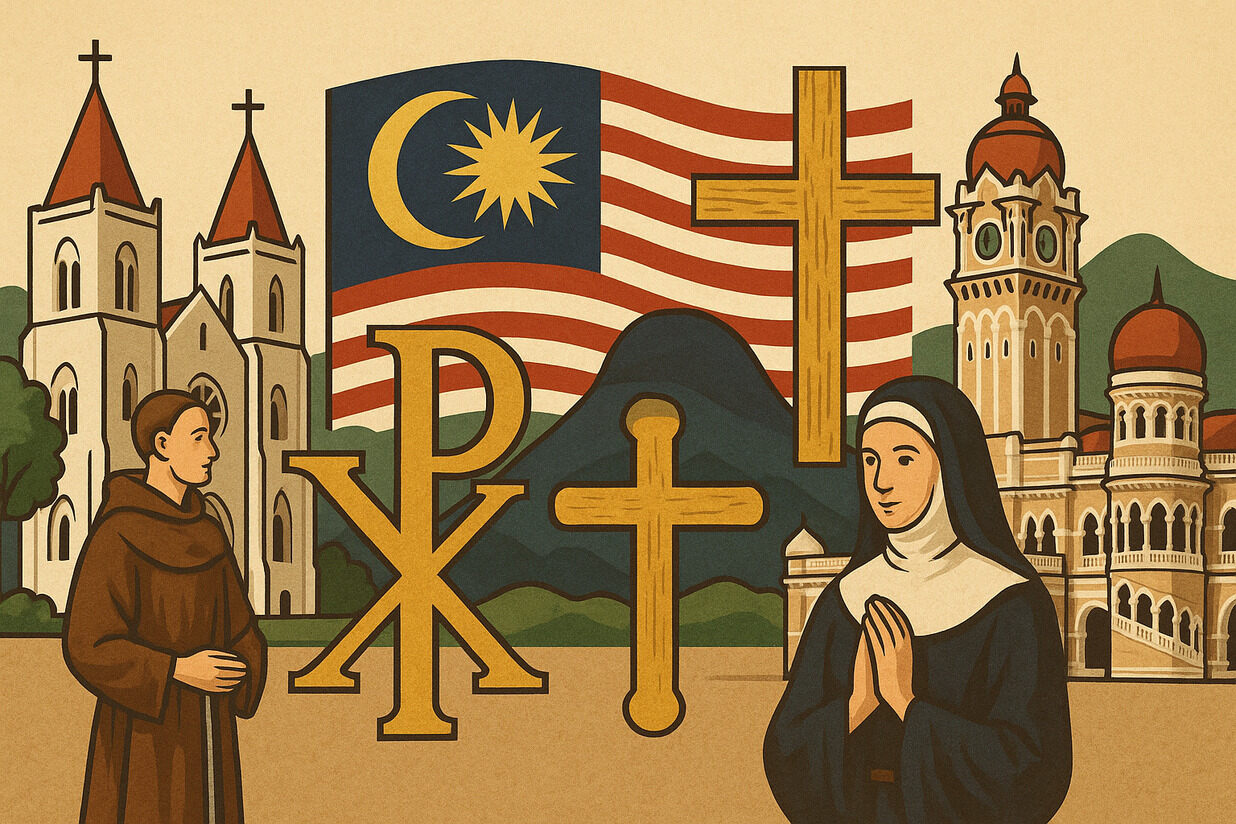Early Arrival of Religious Missionaries in Malaysia
The history of religious orders in Malaysia begins long before formal Church institutions were established. Along the coasts and trade routes of the Malay Peninsula, missionaries arrived with one purpose: to share the Gospel and build faith-based communities. Most of these religious orders came from Europe and brought with them a simple lifestyle rooted in prayer, discipline, and service.
Among the first to arrive were the Franciscan missionaries, known for their humility and commitment to the poor. They began modest chapels and small schools to serve local communities. Though their numbers were few, their legacy was strong—they brought not only faith but also literacy, basic education, and healthcare support to remote regions.
These early missions laid the groundwork for the broader Church in Malaysia. From these humble beginnings, more formal religious institutions would later emerge.
The Growth of Religious Orders During Colonial Times
The arrival of colonial powers provided both opportunities and challenges for the Church. With colonial rule came the expansion of religious orders such as the Jesuits, Dominicans, and Oblates. These groups saw an opportunity to strengthen the Church’s presence through education, healthcare, and social outreach.
The Jesuits were especially known for their focus on education. They established some of the earliest Catholic schools in the region—institutions that would go on to become hallmarks of academic excellence. Meanwhile, the Oblates of Mary Immaculate focused on bringing pastoral care to underserved rural areas.
Despite being under colonial authority, these orders were often supported by local communities. Their work was not seen as foreign imposition but as genuine care and development. This collaboration helped Catholic institutions flourish throughout the country.
The Vital Role of Nuns and Religious Women
One of the most enduring contributions in the history of religious orders in Malaysia comes from religious women. Catholic nuns played critical roles in education, healthcare, and social care—often working in places that had been overlooked by society.
Congregations like the Sisters of St. Joseph cared for orphans and the poor, establishing schools and orphanages. The Franciscan Missionaries of Mary provided healthcare through clinics and outreach programs, especially for women and children.
Through simple living and unwavering prayer, these sisters modeled the Gospel not only through words but through action. Their contribution remains a cornerstone of the Church’s work in Malaysia.
Education as a Central Mission
Education has always been a defining aspect of Catholic ministry. The religious orders in Malaysia viewed education as a direct way to live out Gospel values. Many Catholic schools originated in chapels, convents, or mission houses.
These schools taught academic subjects, but also emphasized values such as discipline, compassion, and moral integrity. Over time, many alumni from Catholic institutions have become leaders in Malaysian society, attributing their success to the formative education they received.
Even today, Catholic schools in Malaysia maintain a reputation for high standards and holistic education—thanks to the pioneering efforts of religious orders.
Challenges in Promoting Vocations
As the Catholic Church grew, one challenge became increasingly visible: the decline in religious vocations. Fewer young Malaysians chose to enter seminaries, convents, or religious formation houses. Social change, increased career opportunities, and evolving cultural norms contributed to this decline.
However, efforts to encourage new vocations continue. The Church organizes vocation retreats, mentorship programs, and spiritual direction opportunities to help youth discern their calling.
Responding to a vocation requires more than interest—it demands community support, prayer, and strong faith. Families, parishes, and Church leaders play a vital role in reviving enthusiasm for religious life.
Connection with Local Communities
A major reason for the sustained success of religious orders in Malaysia is their deep connection to local communities. Rather than standing apart from the people, religious orders lived and worked alongside them.
Whether through medical missions, Franciscan missions, or community development projects, religious orders built trust by showing solidarity. Their goal was never to impose beliefs but to demonstrate them through love and service.
This connection fostered not only acceptance but also lasting relationships. Today, many communities still remember the sisters, brothers, and priests who shaped their lives through compassion and faith.
Adapting to a Modern Society
In modern Malaysia, religious orders are adapting to new realities. While their traditional roles in education and pastoral care remain important, they are also entering digital spaces and addressing contemporary social issues.
Some religious sisters now host online catechism classes or run faith-based Instagram accounts. Priests offer online spiritual direction for those unable to attend in-person services. Others advocate for mental health awareness, migrant rights, or environmental care.
This flexibility ensures that religious orders stay relevant and impactful. They may use different tools today, but their mission remains unchanged—to love, to serve, and to bring God’s light into the world.
Emergence of New Religious Congregations
In recent years, newer religious congregations have appeared in Malaysia. These groups often focus on modern ministries like youth empowerment, social justice, and intercultural dialogue.
For example, some new congregations work with migrant workers, offer support for persons with disabilities, or run digital outreach programs for teenagers. They reflect the evolving nature of Catholic vocation—one that meets the changing needs of society.
These new forms of ministry show that religious life is not outdated. Instead, it is dynamic, creative, and still central to the Church’s mission.
Lasting Influence of Religious Orders in Malaysia
The history of religious orders in Malaysia is a story of silent impact. From establishing schools and clinics to nurturing faith, values, and service, religious orders have shaped lives in quiet yet powerful ways across generations and regions.
Even today, their legacy endures in every student taught, patient healed, and community uplifted. Though their names may not be widely known, their influence lives on in the hearts they’ve touched and the institutions they helped build.
As the Church looks to the future, religious orders will continue to be pillars of education, spirituality, and compassion—guiding Malaysia toward a more just, inclusive, and loving society rooted in shared values and faith.
